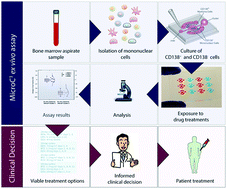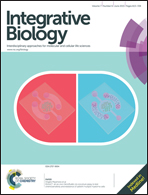MicroC3: an ex vivo microfluidic cis-coculture assay to test chemosensitivity and resistance of patient multiple myeloma cells†
Abstract
Chemosensitivity and resistance assays (CSRAs) aim to direct therapies based upon ex vivo responses of patient tumor cells to chemotherapeutic drugs. However, successful CSRAs are yet to be developed. Here, we exposed primary CD138+ multiple myeloma (MM) cells to bortezomib, a clinical proteasome inhibitor, in microfluidic-cis-coculture (MicroC3) incorporating the patient's own CD138− tumor-companion mononuclear cells to integrate some of the patients' own tumor microenvironment components in the CSRA design. Statistical clustering techniques segregated MicroC3 responses into two groups which correctly identified all seventeen patients as either clinically responsive or non-responsive to bortezomib-containing therapies. In contrast, when the same patient MM samples were analyzed in the absence of the CD138− cells (monoculture), the tumor cell responses did not segregate into clinical response clusters. Thus, MicroC3 identified bortezomib-therapy MM patient responses making it a viable CSRA candidate toward enabling personalized therapy.


 Please wait while we load your content...
Please wait while we load your content...